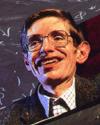 (source)
(source)
|
Stephen W. Hawking
(8 Jan 1942 - 14 Mar 2018)
English theoretical physicist and cosmologist.
|
Science Quotes by Stephen W. Hawking (56 quotes)
>> Click for Stephen W. Hawking Quotes on | God | Science | Universe |
>> Click for Stephen W. Hawking Quotes on | God | Science | Universe |
…there is no prescribed route to follow to arrive at a new idea. You have to make the intuitive leap. But the difference is that once you’ve made the intuitive leap you have to justify it by filling in the intermediate steps. In my case, it often happens that I have an idea, but then I try to fill in the intermediate steps and find that they don’t work, so I have to give it up.
— Stephen W. Hawking
In Michael Harwood, 'The Universe and Dr. Hawking', New York Times Magazine (23 Jan 1983), 53.
[On President Bush's plan to get to Mars in 10 years] Stupid. Robots would do a better job and be much cheaper because you don't have to bring them back.
— Stephen W. Hawking
Interview with Deborah Solomon, 'The Science of Second-Guessing', in New York Times Magazine (12 Dec 2004), 37.
[Question: Do you feel that scientists correct themselves as often as they should?]
More often than politicians, but not as often as they should.
More often than politicians, but not as often as they should.
— Stephen W. Hawking
Interview with Deborah Solomon, 'The Science of Second-Guessing', in New York Times Magazine (12 Dec 2004), 37.
[Question: What do you think was the most important physics idea to emerge this year?]
We won't know for a few years.
We won't know for a few years.
— Stephen W. Hawking
Interview with Deborah Solomon, 'The Science of Second-Guessing', in New York Times Magazine (12 Dec 2004), 37.
A lot of prizes have been awarded for showing the universe is not as simple as we might have thought.
— Stephen W. Hawking
In A Brief History of Time, (1988, 1998), 80.
According to the Boshongo people of central Africa, in the beginning, there was only darkness, water, and the great god Bumba. One day Bumba, in pain from a stomach ache, vomited up the sun. The sun dried up some of the water, leaving land. Still in pain, Bumba vomited up the moon, the stars, and then some animals. The leopard, the crocodile, the turtle, and finally, man. This creation myth, like many others, tries to answer the questions we all ask. Why are we here? Where did we come from?
— Stephen W. Hawking
Lecture (1987), 'The Origin of the Universe', collected in Black Holes And Baby Universes And Other Essays (1993), 99.
Aggression has had definite advantages for survival, but when modern technology meets ancient aggression the entire human race and much of the rest of life on Earth is at risk. … It is not clear that, unlike aggression, intelligence has any long-term survival value.
— Stephen W. Hawking
In 'A Step Backward For Civilization', The Washington Post (16 Feb 2014), Sec. A, 21.
All of my life, I have been fascinated by the big questions that face us, and have tried to find scientific answers to them. If, like me, you have looked at the stars, and tried to make sense of what you see, you too have started to wonder what makes the universe exist.
— Stephen W. Hawking
From website for PBS program, Stephen Hawking's Universe (1997).
At first I became depressed. I seemed to be getting worse pretty rapidly. There didn’t seem any point in working on my Ph.D. because I didn’t know I would live long enough to finish it.
— Stephen W. Hawking
In a message to his 70th birthday celebration, delivered at a public symposium in Cambridge, England (which ill health prevented him from attending). As quoted in Alok Jha, 'Stephen Hawking marks 70th birthday with speech to leading cosmologists', The Guardian (8 Jan 2012). (Around the age of 21, as he started his Ph.D. in Cambridge, Hawking was diagnosed with motor neurone disease.)
Consideration of particle emission from black holes would seem to suggest that God not only plays dice, but also sometimes throws them where they cannot be seen.
— Stephen W. Hawking
'The Quantum Mechanics of Black Holes', Scientific American, 1977, 236, 40.
Disorder increases with time because we measure time in the direction in which disorder increases.
— Stephen W. Hawking
In 'The Direction of Time', New Scientist (9 Jul 1987), 115, No. 1568, 47. Also in 'The Arrow of Time', A Brief History of Time: From the Big Bang to Black Holes (1988, 1998), Chap. 9, 152.
Einstein was wrong when he said, 'God does not play dice'. Consideration of black holes suggests, not only that God does play dice, but that he sometimes confuses us by throwing them where they can't be seen.
— Stephen W. Hawking
In The Nature Of Space And Time (1996, 2010), 26.
Even if there is only one possible unified theory, it is just a set of rules and equations. What is it that breathes fire into the equations and makes a universe for them to describe? The usual approach of science of constructing a mathematical model cannot answer the questions of why there should be a universe for the model to describe. Why does the universe go to all the bother of existing?
— Stephen W. Hawking
A Brief History of Time (1998), 190.
God not only plays dice. He also sometimes throws the dice where they cannot be seen.
— Stephen W. Hawking
In 'News and Views: The Breakdown of Physics?', Nature (2 Oct 1975), 257, 362. [A reference to Albert Einstein’s earlier quote on dice].
Hubble's observations suggested that there was a time, called the big bang, when the universe was infinitesimally small and infinitely dense. Under such conditions all the laws of science, and therefore all ability to predict the future, would break down. If there were events earlier than this time, then they could not affect what happens at the present time. Their existence can be ignored because it would have no observational consequences. One may say that time had a beginning at the big bang, in the sense that earlier times simply would not be defined. It should be emphasized that this beginning in time is very different from those that had been considered previously. In an unchanging universe a beginning in time is something that has to be imposed by some being outside the universe; there is no physical necessity for a beginning. One can imagine that God created the universe at literally any time in the past. On the other hand, if the universe is expanding, there may be physical reasons why there had to be a beginning. One could still imagine that God created the universe at the instant of the big bang, or even afterwards in just such a way as to make it look as though there had been a big bang, but it would be meaningless to suppose that it was created before the big bang. An expanding universe does not preclude a creator, but it does place limits on when he might have carried out his job!
— Stephen W. Hawking
A Brief History of Time: From the Big Bang to Black Holes (1988), 8-9.
I don’t think there is one unique real universe. ... Even the laws of physics themselves may be somewhat observer dependent.
— Stephen W. Hawking
…...
I have always supported women’s rights. I moved the admission of women to my college, Gonville and Caius College, Cambridge. The results were wholly good.
— Stephen W. Hawking
From TV show interview with Piers Morgan, on ITV, 'Good Morning Britain'. Transcribed from online video, 'Stephen Hawking on Donald Trump's US: "I Fear I May Not Be Welcome" | Good Morning Britain' on youtube.com website. Also quoted in Sarah Knapton, 'Five Most Powerful People in Britain are Women, says Prof Stephen Hawking', Daily Telegraph (20 Mar 2017).
I have noticed even people who claim everything is predestined, and that we can do nothing to change it, look before they cross the road.
— Stephen W. Hawking
In Black Holes and Baby Universes and Other Essays (1993), 134.
I have sold more books on physics than Madonna has on sex.
[Hawking adopted this statement from a remark made to him by his former post-doc, Nathan Myhrvold.]
[Hawking adopted this statement from a remark made to him by his former post-doc, Nathan Myhrvold.]
— Stephen W. Hawking
The Illustrated A Brief History of Time, Updated and Expanded Edition (1996), Foreward.
I regard the brain as a computer which will stop working when its components fail. There is no heaven or afterlife for broken down computers; that is a fairy story for people afraid of the dark.
— Stephen W. Hawking
'Stephen Hawking: "There is no heaven; it's a fairy story"', interview in newspaper The Guardian (15 May 2011).
I think the next [21st] century will be the century of complexity. We have already discovered the basic laws that govern matter and understand all the normal situations. We don’t know how the laws fit together, and what happens under extreme conditions. But I expect we will find a complete unified theory sometime this century. The is no limit to the complexity that we can build using those basic laws.
[Answer to question: Some say that while the twentieth century was the century of physics, we are now entering the century of biology. What do you think of this?]
[Answer to question: Some say that while the twentieth century was the century of physics, we are now entering the century of biology. What do you think of this?]
— Stephen W. Hawking
'"Unified Theory" Is Getting Closer, Hawking Predicts', interview in San Jose Mercury News (23 Jan 2000), 29A. Answer quoted in Ashok Sengupta, Chaos, Nonlinearity, Complexity: The Dynamical Paradigm of Nature (2006), vii. Question included in Hans-Joachim Schellnhuber, Nicholas Stern and Mario Molina , Global Sustainability: a Nobel Cause (2010), 13. Cite from Brent Davis and Dennis J. Sumara, Complexity and Education: Inquiries Into Learning, Teaching, and Research (2006), 171.
I want my books sold on airport bookstalls.
— Stephen W. Hawking
Interview with Deborah Solomon, 'The Science of Second-Guessing', in New York Times Magazine (12 Dec 2004), 37.
If a superior alien civilisation sent us a message saying, “We’ll arrive in a few decades,” would we just reply, “OK, call us when you get here—we’ll leave the lights on”? Probably not—but this is more or less what is happening with AI. Although we are facing potentially the best or worst thing to happen to humanity in history, little serious research is devoted to these issues outside non-profit institutes such as the Cambridge Centre for the Study of Existential Risk, the Future of Humanity Institute, the Machine Intelligence Research Institute, and the Future of Life Institute. All of us should ask ourselves what we can do now to improve the chances of reaping the benefits and avoiding the risks.
— Stephen W. Hawking
From article with byline attributing several authors collectively, namely: Stephen Hawking, Stuart Russell, Max Tegmark, Frank Wilczek, 'Stephen Hawking: `Transcendence looks at the implications of artificial intelligence—but are we taking AI seriously enough?’', Independent. Posted on the newspaper site www.independent.co.uk (01 May 2014). The article does not given an individual attribution to the quoter, so it is not clear if Stephen Hawking contributed it, and it is easily possible he did not. Thus this entry is filed under his name only because he is the first-listed in the byline.
If one is physically disabled, one cannot afford to be psychologically disabled as well.
— Stephen W. Hawking
In 'Handicapped People and Science', Science Digest (Sep 1984), 92, No. 9, 92.
If we do discover a complete unified theory, it should be in time understandable in broad principle by everyone, not just a few scientists. Then we shall all, philosophers, scientists and just ordinary people, be able to take part in the discussion of why it is that we and the universe exist. If we find the answer to that, it would be the ultimate triumph of human reason—for then we would know the mind of God.
— Stephen W. Hawking
A Brief History of Time (1988), 191.
If we factor in high-powered women in Europe as well, such as [German Chancellor] Angela Merkel, it seems we are witnessing a seismic shift for women to accede to high-level positions in politics and society. But there may still be a gap between those women achieving high public status and those in the private sector. I welcome these signs of women’s liberation.
— Stephen W. Hawking
From TV show interview with Piers Morgan, on ITV, 'Good Morning Britain'. Transcribed from online video, 'Stephen Hawking on Donald Trump's US: "I Fear I May Not Be Welcome" | Good Morning Britain' on youtube.com website. Also quoted online at huffingtonpost.com in Hayley Miller, 'Stephen Hawking Teaches Piers Morgan A Valuable Lesson In Gender Equality', Huffington Post (20 Mar 2017), but given there with sentences reordered as 1st, 3rd, 2nd.
It is not scientific proof of gender equality that is required, but general acceptance that women are at least the equals of men or better—this is coming.
— Stephen W. Hawking
From TV show interview with Piers Morgan, on ITV, 'Good Morning Britain'. Transcribed from online video, 'Stephen Hawking on Donald Trump's US: "I Fear I May Not Be Welcome" | Good Morning Britain' on youtube.com website. Also quoted online in 4 of Stephen Hawking's most inspirational quotes on success and happiness, '4 of Stephen Hawking's most inspirational quotes on success and happiness' (14 Mar 2018), on cnbc,com website.
It is said that fact is sometimes stranger than fiction, and nowhere is this more true than in the case of black holes. Black holes are stranger than anything dreamt up by science fiction writers.
— Stephen W. Hawking
In Lecture, 'Into a Black Hole' (2008). On hawking.org website.
Let me describe briefly how a black hole might be created. Imagine a star with a mass 10 times that of the sun. During most of its lifetime of about a billion years the star will generate heat at its center by converting hydrogen into helium. The energy released will create sufficient pressure to support the star against its own gravity, giving rise to an object with a radius about five times the radius of the sun. The escape velocity from the surface of such a star would be about 1,000 kilometers per second. That is to say, an object fired vertically upward from the surface of the star with a velocity of less than 1,000 kilometers per second would be dragged back by the gravitational field of the star and would return to the surface, whereas an object with a velocity greater than that would escape to infinity.
When the star had exhausted its nuclear fuel, there would be nothing to maintain the outward pressure, and the star would begin to collapse because of its own gravity. As the star shrank, the gravitational field at the surface would become stronger and the escape velocity would increase. By the time the radius had got down to 10 kilometers the escape velocity would have increased to 100,000 kilometers per second, the velocity of light. After that time any light emitted from the star would not be able to escape to infinity but would be dragged back by the gravitational field. According to the special theory of relativity nothing can travel faster than light, so that if light cannot escape, nothing else can either. The result would be a black hole: a region of space-time from which it is not possible to escape to infinity.
When the star had exhausted its nuclear fuel, there would be nothing to maintain the outward pressure, and the star would begin to collapse because of its own gravity. As the star shrank, the gravitational field at the surface would become stronger and the escape velocity would increase. By the time the radius had got down to 10 kilometers the escape velocity would have increased to 100,000 kilometers per second, the velocity of light. After that time any light emitted from the star would not be able to escape to infinity but would be dragged back by the gravitational field. According to the special theory of relativity nothing can travel faster than light, so that if light cannot escape, nothing else can either. The result would be a black hole: a region of space-time from which it is not possible to escape to infinity.
— Stephen W. Hawking
'The Quantum Mechanics of Black Holes', Scientific American, 1977, 236, 34-40.
My expectations were reduced to zero when I was 21. Everything since then has been a bonus.
— Stephen W. Hawking
Interview with Deborah Solomon, 'The Science of Second-Guessing', in New York Times Magazine (12 Dec 2004), 37.
My goal is simple. It is a complete understanding of the universe, why it is as it is and why it exists at all.
— Stephen W. Hawking
In the Washington Post, April 15, 1988.
One is always a long way from solving a problem until one actually has the answer.
— Stephen W. Hawking
…...
People who boast about their I.Q. are losers.
— Stephen W. Hawking
Interview with Deborah Solomon, 'The Science of Second-Guessing', in New York Times Magazine (12 Dec 2004), 37.
Science is beautiful when it makes simple explanations of phenomena or connections between different observations. Examples include the double helix in biology, and the fundamental equations of physics.
[Answer to question: What are the things you find most beautiful in science?]
[Answer to question: What are the things you find most beautiful in science?]
— Stephen W. Hawking
'Stephen Hawking: "There is no heaven; it's a fairy story"', interview in newspaper The Guardian (15 May 2011).
Science predicts that many different kinds of universe will be spontaneously created out of nothing. It is a matter of chance which we are in.
[Answer to question: You've said there is no reason to invoke God to light the blue touchpaper. Is our existence all down to luck?]
[Answer to question: You've said there is no reason to invoke God to light the blue touchpaper. Is our existence all down to luck?]
— Stephen W. Hawking
'Stephen Hawking: "There is no heaven; it's a fairy story"', interview in newspaper The Guardian (15 May 2011).
Someone told me that each equation I included in the book would halve the sales.
— Stephen W. Hawking
In A Brief History of Time: From the Big Bang to Black Holes (1988, 1990), vi.
Something to remember. If you have remembered every word in this article, your memory will have recorded about 150 000 bits of information. Thus, the order in your brain will have increased by about 150 000 units. However, while you have been reading the article, you will have converted about 300 000 joules of ordered energy, in the form of food, into disordered energy, in the form of heat which you lose to the air around you by convection and sweat. This will increase the disorder of the Universe by about 3 x 1024 units, about 20 million million million times the increase in order because you remember my article.
— Stephen W. Hawking
An afterword to his three-page article discussing thermodynamics and entropy, in 'The Direction of Time', New Scientist (9 Jul 1987), 49.
The eventual goal of science is to provide a single theory that describes the whole universe.
— Stephen W. Hawking
…...
The increase of disorder or entropy with time is one example of what is called an arrow of time something that gives a direction to time and distinguishes the past from the future. There are at least three different directions of time. First, there is the thermodynamic arrow of time—the direction of time in which disorder or entropy increases. Second, there is the psychological arrow of time. This is the direction in which we feel time passes—the direction of time in which we remember the past, but not the future. Third, there is the cosmological arrow of time. This is the direction of time in which the universe is expanding rather than contracting.
— Stephen W. Hawking
In 'The Direction of Time', New Scientist (9 Jul 1987), 46.
The media need superheroes in science just as in every sphere of life.
— Stephen W. Hawking
Interview with Deborah Solomon, 'The Science of Second-Guessing', in New York Times Magazine (12 Dec 2004), 37.
The quantum theory of gravity has opened up a new possibility, in which there would be no boundary to space-time and so there would be no need to specify the behaviour at the boundary. There would be no singularities at which the laws of science broke down and no edge of space-time at which one would have to appeal to God or some new law to set the boundary conditions for space-time. One could say: 'The boundary condition of the universe is that it has no boundary.' The universe would be completely self-contained and not affected by anything outside itself. It would neither be created nor destroyed. It would just BE.
— Stephen W. Hawking
A Brief History of Time: From the Big Bang to Black Holes (1988), 136.
The universe is governed by science. But science tells us that we can’t solve the equations, directly in the abstract. We need to use the effective theory of Darwinian natural selection of those societies most likely to survive. We assign them higher value.
[Answer to question: What is the value in knowing “Why are we here?”]
[Answer to question: What is the value in knowing “Why are we here?”]
— Stephen W. Hawking
'Stephen Hawking: "There is no heaven; it’s a fairy story"', interview in newspaper The Guardian (15 May 2011).
The whole history of science has been the gradual realization that events do not happen in an arbitrary manner, but that they reflect a certain underlying order, which may or may not be divinely inspired.
— Stephen W. Hawking
A Brief History of Time (1998), 127.
The world has changed far more in the past 100 years than in any other century in history. The reason is not political or economic but technological—technologies that flowed directly from advances in basic science. Clearly, no scientist better represents those advances than Albert Einstein: TIME’s Person of the Century.
— Stephen W. Hawking
'A Brief History of Relativity'. Time (31 Dec 1999).
There are something like ten million million million million million million million million million million million million million million (1 with eighty zeroes after it) particles in the region of the universe that we can observe. Where did they all come from? The answer is that, in quantum theory, particles can be created out of energy in the form of particle/antiparticle pairs. But that just raises the question of where the energy came from. The answer is that the total energy of the universe is exactly zero. The matter in the universe is made out of positive energy. However, the matter is all attracting itself by gravity. Two pieces of matter that are close to each other have less energy than the same two pieces a long way apart, because you have to expend energy to separate them against the gravitational force that is pulling them together. Thus, in a sense, the gravitational field has negative energy. In the case of a universe that is approximately uniform in space, one can show that this negative gravitational energy exactly cancels the positive energy represented by the matter. So the total energy of the universe is zero.
— Stephen W. Hawking
A Brief History of Time: From the Big Bang to Black Holes (1988), 129.
There could be whole antiworlds and antipeople made out of antiparticles. However, if you ever meet your antiself, don’t shake hands! You would both vanish in a great flash of light.
— Stephen W. Hawking
…...
There may only be a small number of laws, which are self-consistent and which lead to complicated beings like ourselves. … And even if there is only one unique set of possible laws, it is only a set of equations. What is it that breathes fire into the equations and makes a universe for them to govern? Is the ultimate unified theory so compelling that it brings about its own existence?
— Stephen W. Hawking
Lecture (1987), 'The Origin of the Universe', collected in Black Holes And Baby Universes And Other Essays (1993), 99.
To confine our attention to terrestrial matters would be to limit the human spirit.
— Stephen W. Hawking
…...
Today scientists describe the universe in terms of two basic partial theories—the general theory of relativity and quantum mechanics. They are the great intellectual achievements of the first half of this century. The general theory of relativity describes the force of gravity and the large-scale structure of the universe, that is, the structure on scales from only a few miles to as large as a million million million million (1 with twenty-four zeros after it) miles, the size of the observable universe. Quantum mechanics, on the other hand, deals with phenomena on extremely small scales, such as a millionth of a millionth of an inch. Unfortunately, however, these two theories are known to be inconsistent with each other—they cannot both be correct.
— Stephen W. Hawking
A Brief History of Time: From the Big Bang to Black Holes (1988), 11-2.
We already know the physical laws that govern everything we experience in everyday life … It is a tribute to how far we have come in theoretical physics that it now takes enormous machines and a great deal of money to perform an experiment whose results we cannot predict.
— Stephen W. Hawking
From Inaugural Lecture (29 Apr 1980) as Lucasian Professor at Cambridge University, 'Is the End in Sight for Theoretical Physics?', collected in Black Holes and Baby Universes and Other Essays (1993), 50 & 64.
We are insignificant creatures on a small rock orbiting a very average star in the outer suburbs
of one of a hundred thousand million galaxies.
— Stephen W. Hawking
From interview with Ken Campbell in Channel 4 TV program 'Beyond Our Ken', episode 3 of Reality on the Rocks (1995).
We see the universe the way it is because if it were different, we would not be here to observe it.
— Stephen W. Hawking
In the Washington Post, April 15, 1988.
We shall not have a complete theory until we can do more than merely say that “Things are as they are because they were as they were.”
— Stephen W. Hawking
From Inaugural Lecture (29 Apr 1980) as Lucasian Professor at Cambridge University, 'Is the End in Sight for Theoretical Physics?', collected in Black Holes and Baby Universes and Other Essays (1993), 51.
We should seek the greatest value of our action.
[Answer to question: So here we are. What should we do?]
[Answer to question: So here we are. What should we do?]
— Stephen W. Hawking
'Stephen Hawking: "There is no heaven; it's a fairy story"', interview in newspaper The Guardian (15 May 2011).
What I have done is to show that it is possible for the way the universe began to be determined by the laws of science. In that case, it would not be necessary to appeal to God to decide how the universe began. This doesn't prove that there is no God, only that God is not necessary. (17 Oct 1988)
— Stephen W. Hawking
Der Spiegel (17 Oct 1988). Quoted in Clifford A. Pickover, Archimedes to Hawking (2008), 483.
When I discuss intelligent life in the universe, I take this to include the human race, even though much of its behavior throughout history appears not to have been calculated to aid the survival of the species.
— Stephen W. Hawking
In 'A Step Backward For Civilization', The Washington Post (16 Feb 2014), Sec. A, 21.
Quotes by others about Stephen W. Hawking (6)
Do these models give a pointer to God? The steady-state universe, the Hawking model... and the infinitely oscillating model decidedly do not. One might almost regard them as models manufactured for a Society of Atheists.
'From Entropy to God', in K. Martinas, L. Ropolyi and P. Szegedi (eds.) Thermodynamics: History and Philosophy: Facts, Trends, Debates (1991), 386.
Walking the streets of Tokyo with Hawking in his wheelchair ... I felt as if I were taking a walk through Galilee with Jesus Christ [as] crowds of Japanese silently streamed after us, stretching out their hands to touch Hawking's wheelchair. ... The crowds had streamed after Einstein [on Einstein's visit to Japan in 1922] as they streamed after Hawking seventy years later. ... They showed exquisite choice in their heroes. ... Somehow they understood that Einstein and Hawking were not just great scientists, but great human beings.
Foreward to Alice Calaprice, The Quotable Einstein (1996), xiii-xiv.
Theorists write all the popular books on science: Heinz Pagels, Frank Wilczek, Stephen Hawking, Richard Feynman, et al. And why not? They have all that spare time.
In Leon Lederman and Dick Teresi, The God Particle: If the Universe is the Answer, What is the
Question (1993), 15.
It’s that moment, that brief epiphany when the universe opens up and shows us something, and in that instant we get just a sense of an order greater than Heaven and, as yet at least, beyond the grasp of Stephen Hawking.
Quoted in Kim Lim (ed.), 1,001 Pearls of Spiritual Wisdom: Words to Enrich, Inspire, and Guide Your Life (2014), 109
Suppose physics soon succeeds, as Stephen Hawking and a few other physicists hope and believe, in reducing physics to a single equation or a small set of equations that will “explain” all of nature’s fundamental laws. We can then ask the unanswerable question, "Why this set of equations?”
In Introduction, The Night Is Large: Collected Essays 1938-1995 (1996), xvii.
Why does the universe, as Hawking has recently phrased it, go to all the bother of existing? Why is there something rather than nothing? Things would be so much simpler if nothing, absolutely nothing, existed, not even a God.
In Introduction, The Night Is Large: Collected Essays 1938-1995 (1996), xvii.
See also:
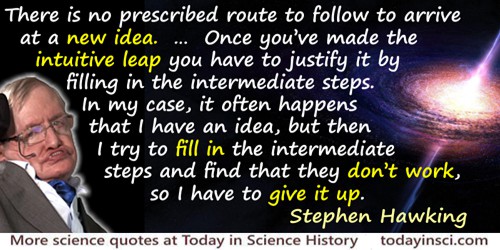
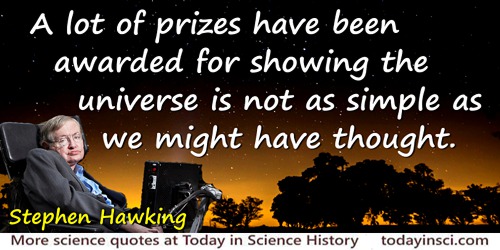
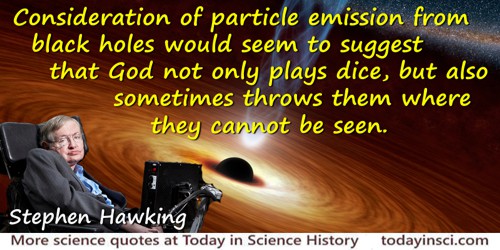

![Stephen W. Hawking quote: If we factor in high-powered women in Europe as well, such as [German Chancellor] Angela Merkel,](https://todayinsci.com/H/Hawking_Stephen/HawkingStephen-Gap500x250px.jpg)

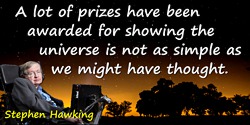
![Stephen W. Hawking quote: If we factor in high-powered women in Europe as well, such as [German Chancellor] Angela Merkel,](https://todayinsci.com/H/Hawking_Stephen/HawkingStephen-GapThm.jpg)

 In science it often happens that scientists say, 'You know that's a really good argument; my position is mistaken,' and then they would actually change their minds and you never hear that old view from them again. They really do it. It doesn't happen as often as it should, because scientists are human and change is sometimes painful. But it happens every day. I cannot recall the last time something like that happened in politics or religion.
(1987) --
In science it often happens that scientists say, 'You know that's a really good argument; my position is mistaken,' and then they would actually change their minds and you never hear that old view from them again. They really do it. It doesn't happen as often as it should, because scientists are human and change is sometimes painful. But it happens every day. I cannot recall the last time something like that happened in politics or religion.
(1987) -- 


